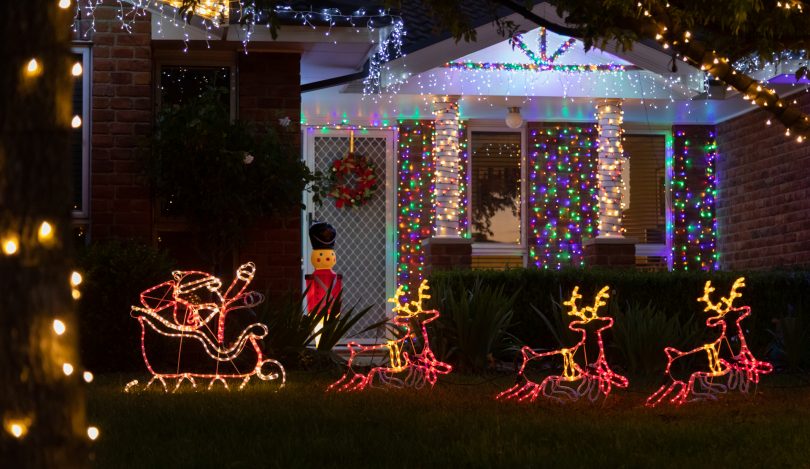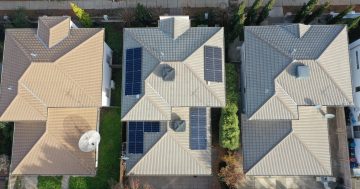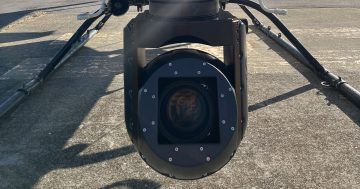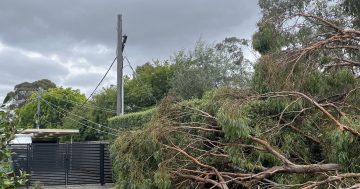
It might not feel very festive, but electrical safety is something to keep in mind this Christmas. Photo: Thomas Lucraft.
All the fantastic Christmas decorations – both inside and outside – are guaranteed to fill even the biggest Scrooge with a twinkle of joy.
But Canberrans have been warned that all those lights can lead to disaster unless electrical safety is part of the process.
Most Christmas lights are low voltage and safe, but if they’re clustered together near something flammable or put through overloaded power points, you could end up with a situation on your hands.
“Some neighbours like to be really competitive about how many lights they have and put lots of decorations up, so you really need to look and make sure you’re not overloading your power circuits, and also that you’re not creating a lot of heat out of that,” EvoEnergy general manager Peter Billing said.
“Light is heat, so that closeness together can be a bit of an issue as well.”
Many older homes don’t necessarily have double points where you can plug in decorations side-by-side.
This can tempt people to plug in a powerboard, and then put double adapters on top of that to ensure every decoration can be plugged in and shining.
If you’re feeling that temptation, resist it.
“That will just overload the circuit, it really is designed to not have that much load on it, so be very conscious of how much you’re connecting,” Mr Billing said.
“You could end up with a fire, that’s your worst case, or an electric shock out of it.”
As for your outside lights, if they’re solar-powered and have their own batteries, usually they’re good to go.
But EvoEnergy customer delivery assistant manager Bronwen Butterfield warned that if you have to plug them in, make sure it’s into an outlet that is protected with a cover.
“If they’re not, there’s a serious risk of weather impacting on that, particularly wet weather, and that could cause an issue,” she said.
If you’re using an extension cord, also make sure it’s not in a puddle or somewhere it can get wet.
Also, ensure all cords are safe and have no damage to them. As many of us have metal roofs, any loose electricity can be conducted across the entire top of your house.
“For example, if you had an extension cord up to some lights on your roof, and it’s near a gutter and the electricity erupts through, it could enliven the gutter and you could get a shock off the gutter,” Mr Billing said.
You can call 13 10 93 for EvoEnergy to investigate the source of any tingles or shocks you experience in your home.
Electrical safety is also something to keep in mind if you’re travelling away this Christmas.
Ensure all lights and non-essential electrical appliances, such as TVs, have been turned off at the powerpoint, so then if there’s a surge while you’re away there will be no damage (it can help you save a bit on your bill as well).
If you’re driving and you hit a powerpole or other electrical asset, stay in your vehicle.
Mr Billing explained while a safety system should ensure any downed lines aren’t live, it shouldn’t be considered safe until it’s fully tested and isolated.
“If it is live, there’s a thing called step voltage. So if there’s a wire on the ground at a 1000 volts, as you go away from the line that voltage will slowly dissipate,” he said.
“So if your feet are [apart] and you’ve got 1000 volts here and you’ve got 50 volts here, then it’s that potential difference [of voltage] through your feet that could actually cause you to get quite a severe shock, or could kill [you].”
Lines could also electrify the outside of your car, and you could accidentally touch a live wire when climbing out.
If you do need to get out, make sure you jump clear and keep your feet together. You need to know you’ll be able to remain stable and not fall over.
If you witness a crash with a powerpole or conductor box, keep at least 10 metres away and treat it as live. Call emergency services and let them know lines are down so the crews can also be as safe as possible.





















